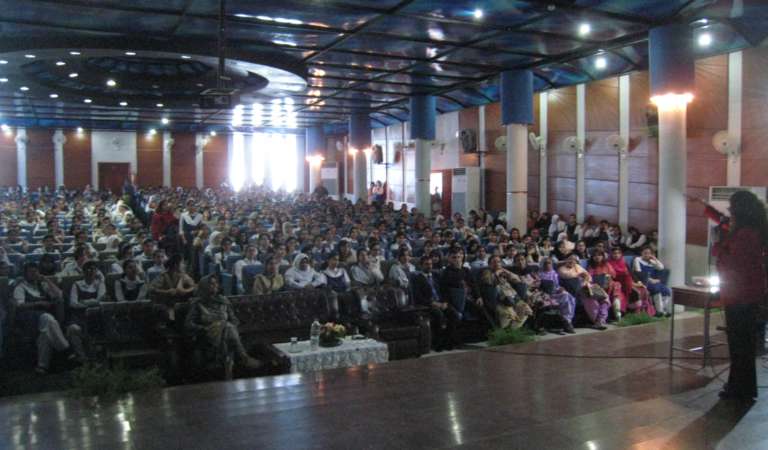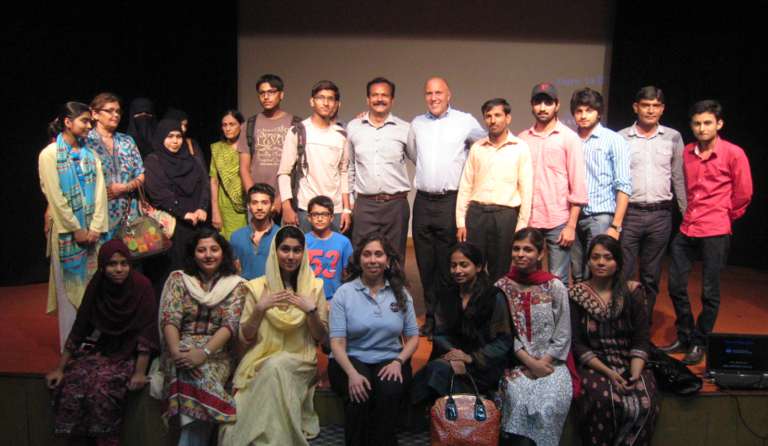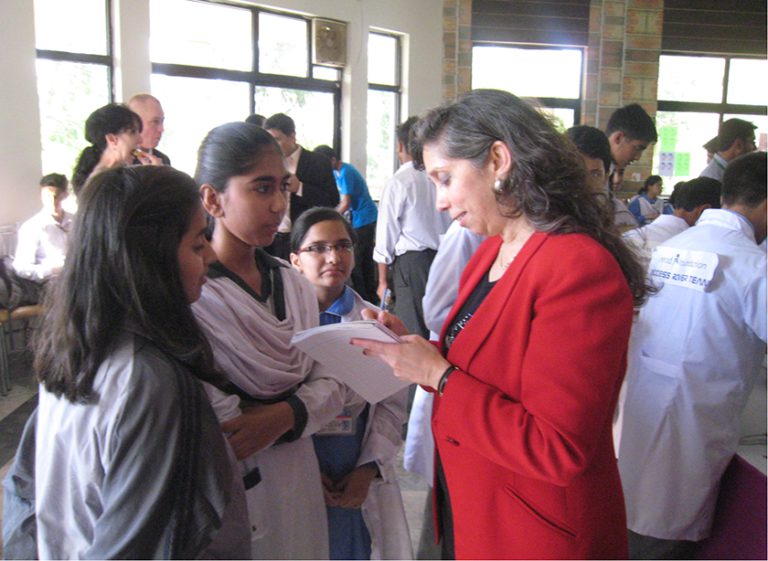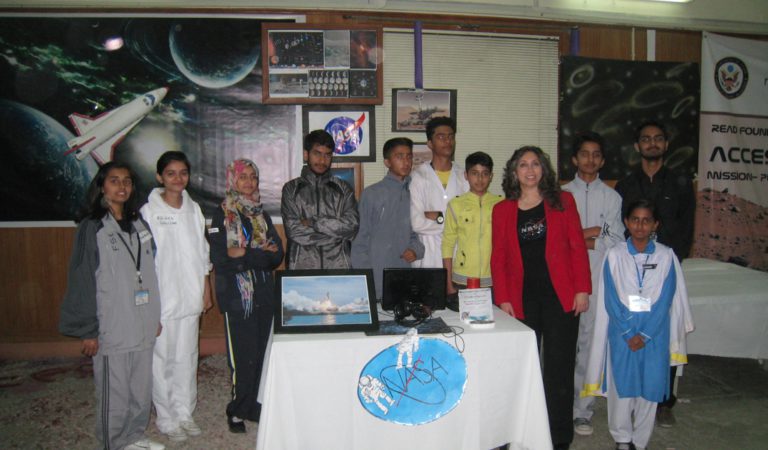Nagin Cox • Sep 18, 2014
NASA's Global Reach: Pakistan
Editor's note: Nagin Cox is a systems engineer and manager at the Jet Propulsion Laboratory currently working on the mission operations team for Curiosity. She is also a gifted public speaker. Earlier this year I was fascinated by her tweets from a trip she took to Pakistan as an ambassador for science and technology, and I asked her to write something about her experience. I thank Nagin for sharing it with us -- and for giving her vacation time in service, sharing her enthusiasm for science and engineering with people around the world. --ESL
Traveling as an invited speaker for the United States State Department is a unique way to experience a country at the side of dedicated and remarkable Foreign Service Officers. It is my privilege to have done this three times in the past, and this was my fourth trip. From May 20 to June 3, I gave 22 talks on space exploration in Pakistan. I was asked to speak about the challenges of NASA’s robotic space exploration but to also address the underlying assumptions about education that enable large-scale engineering and science projects.
While I was only in country for 16 days, the experience was very powerful. There seem to be two different sides to Pakistan. One struggles with the type of society that results from lack of separation of church and state and a significantly corrupted police force, in which half the population is deeply oppressed. As the country tries to make its way into the modern world, an almost insurmountable obstacle is the current lack of reliable electricity in the country. It is virtually impossible for businesses to function given the rolling blackouts that impact both cities and rural areas. The other Pakistan, however, is full of potential for the future. I found youth there to be no different from anywhere else: they were energized and enthusiastic and they showed very clearly how Pakistan “could be.” Many of the venues I spoke in were universities and colleges. I spoke in English and in real time adjusted the level of complexity of my English to accommodate whatever level of fluency in English I was sensing. Universally, the reactions were the same as anywhere else I spoke—they all came unglued with excitement and hope for the future.

I was warned that there is a longstanding dislike of the United States that is likely rooted in mistrust of US policies (current and past) as well as opinions that are difficult to change due to rural illiteracy. While the US did have a role in the Cold War conflicts that shaped Pakistan into a religious state to fight Soviet incursions in Afghanistan, we are also currently the largest donor of non-military aid to Pakistan. I had also heard that Pakistanis dislike not only US policies but also individual Americans. I am pleased to say that was not my experience at all. The institutions we visited seem thrilled to have visitors from the US. I was surprised to find that I was the first American that many of these students and faculty had met. Once we were actually face to face, the Pakistani people, both students and faculty, were warm and welcoming and glad to talk with us. We were in a wide variety of venues and were quite well received in all of them.
A major theme to my presentations was to show how very much NASA counts on using all the national and international brain power available to reach ever more deeply into the solar system, and the great potential benefit to Pakistan of involving 100% of its population in its future. I would often start with my own background of coming from a restrictive Muslim household where the emphasis was on education and sports for the boys, less so for the girls, to talk about how education for a girl could lead to more choices later in life. Rural Pakistan has a distressingly high rate of child marriage and multiple pregnancies for very young girls. When combined with poverty and illiteracy, these girls end up in lives of virtual slavery, much of which is justified economically. In addition, women and girls are seen as the carriers for a family’s honor, and this is further used as a rationale for curtailing their freedoms so as not to endanger the family honor. Even in the cities, which are much more liberal, there is still a long cultural tradition of women serving as domestic servants. Certainly there are plenty of cases where the women are seen as more than chattel and treated with respect and love. However, this is very frequently not the case. Domestic violence is at epidemic levels in the country. With no financial or transportation independence, women are quite effectively trapped in their environment with no recourse. This is an environment in which women are expected and trained from birth to be silent and submissive. There is no assumption that the men can exhibit any self-control at all; the onus is all on the women to dress and act in a way that does not tempt men. This creates a climate of fear for women and impunity for men.
When I spoke in all-girls venues, they would be deeply excited about STEM and doing “something that mattered,” but I also heard a lot of poignant comments about how they "did not know girls could be outspoken.” When I had a mixed audience, I would try to ensure that the women and girls had an opportunity to talk and ask questions, and I tried to seek them out after the lecture to ensure we got a chance to exchange experiences. I tried to share that women everywhere struggle with work/life balance. In some cases, the women would find a way to surround me so the men could not hear and then ask me heart-rending questions like “it’s not true that men are smarter than women, right?" And “I’m not a bad woman because I study and work, right?" Even though I only had a few minutes to talk to them, I did my best to put my heart and soul into my answers and encourage them not to give up and to know that women around the world share the same questions and struggles and that they have the ability to do anything they want to do. I was told that I inspired them by showing them what could be, but I am not sure who was more inspired. I was in awe of their bravery in this environment that is so discouraging to women.

I also, as much as I could, used my body language and demeanor to show the girls an alternative to being silent and submissive. I carried myself with authority and enthusiasm as I would in any other setting. No matter what the environment, mixed or all women, It was my hope that they would remember meeting an American engineer who focused her energies on being a part of a team that was doing something that mattered for all humankind. I wanted to encourage them to stop noticing that they could see my hair or my elbow and listen to what I was SAYING. To their credit, even in the most conservative venues, the men and women took it in stride and tried to roll with it.
After sharing the exciting story of the Mars Rovers, one of the most common topics of discussions in the Q&A was how they could prepare to be a part of the global marketplace. I started out by emphasizing the importance of using your degrees in a workplace to actually do something or create something. Pakistani culture is much like what I encountered in Turkey or Egypt: there is great, great prestige attached to academic degrees and appointments which is wonderfully respectful to education, but it often stops there. There needs to be a corresponding emphasis on following up with on those degrees to use that knowledge to create meaningful change. Thus, the students were fully expecting that I would tell them they needed education, but it surprised them when I emphasized the value of work experience that would help them develop teamwork skills. I also used this opportunity to emphasize that the global workplace has an integrated workforce, and they need to be comfortable with that. Given my “street cred” as a U.S. NASA engineer, it was great to see their enthusiasm. I could almost see them writing down “she says 'be able to work with both men and women.' Check. Next?”
I first realized how legendary NASA is worldwide when I was speaking in Turkey, and it was even more so in Pakistan. In many of the institutions I visited, I was the first American AND I was from NASA. That caused almost unbearable levels of excitement to develop in some schools. At the Institute of Space Technology in Islamabad, it was standing room only, and the students were asking their professors to cancel their lectures so they could attend my presentation. At some of the events, hundreds of students attended the presentation even though they were in exam weeks and classes were over. In one university in AJK Mirpur, the students spontaneously lined the halls and started clapping the minute I got out of the car. Their thirst for information and connections was palpable. As always, I tried not to be too gung-ho about NASA (I do not want to encourage a "brain drain"), but instead encouraged them to work to meet their own country’s needs. I would highlight the accomplishments of the Pakistani space agency, SUPARCO, and show the students that there are exciting things happening in science and engineering within their own borders and how much their skills and enthusiasm are needed in-country.

The NASA stories of robotic exploration missions provide an example of a group of people working together for a common goal on a deadline. That story resonated everywhere for that reason. After almost every lecture, there was a crush of enthusiastic people asking questions and requesting photos. If I had to describe the major impact of the presentations it would be that they showed that you can love what you do and do what you love, regardless of whether you are a man or a woman. Hopefully these students will consider studying at home or abroad and bringing back what they learned to help Pakistan move forward.
I think the trip can be summarized in one anecdote. There was a horrific honor killing in Lahore while I was in the country was later asked in various interviews at the end of my trip what I thought of Pakistan. I told the truth: if I had seen news of this honor killing while I was in the U.S., I would have been furious at how women could be treated this way. But since it happened while I was in the country, my response was more one of disbelief. How can this be? I was only in country for two weeks, but I could already see that Pakistan is better than this, and it does not have to be this way. I am hopeful that of the two Pakistans I saw, it will be the energy and enthusiasm of the youthful, tolerant Pakistan that will prevail. I did not go to Pakistan with any grandiose notions that my presence would make a difference. I can’t change the country myself, but I hope I supported the brave, modern Pakistani men and women who can.

The response to the trip and the presentations was overwhelmingly positive. It is my hope that it encouraged folks to “look up” and see the bigger picture and the world that awaits them rather than focusing on other conflicts and perceived threats. The NASA story was, as always, incredibly powerful in this environment. Exploration is universal and any country can do anything when they educate and utilize the skills and enthusiasm of their young women and men.
Support our core enterprises
Your support powers our mission to explore worlds, find life, and defend Earth. You make all the difference when you make a gift. Give today!
Donate

 Explore Worlds
Explore Worlds Find Life
Find Life Defend Earth
Defend Earth

